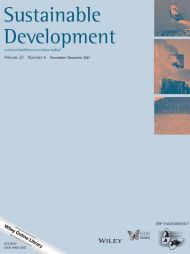An applied framework for assessing the relative deprivation of dam-affected communities
Over the past half century, hydropower dams have displaced 40–80 million people around the world. In the development literature, the outcome of these shocks is represented in the form of “absolute deprivation.” The policy norms surrounding development-induced displacement and resettlement, across all industries, prioritize compensation as the primary means through which to address any short-term deprivation caused by the shock of displacement. One dimension that has been overlooked is the force and effect of “relative deprivation (RD).” To demonstrate the merits of the RD approach, we develop a novel framework to assess the poverty conditions of affected communities across different resettlement schemes in Qinghai Province, China. A review of the case literature shows the scope and depth of deprivations experienced by those directly impacted by project-induced displacement. Our findings offer two important insights. First, that restorative schemes that most closely resemble like-for-like appear to have the least negative impact in RD terms. Second, that the involuntary acquisition of land in hosting communities should be accounted for in the same way as the acquisition of land for the project. The impacts of “indirect” displacement can be significantly greater, particularly when the responsibility for managing or mitigating these impacts falls outside the formal scope of the project.
Language: English
Publisher: Sustainable Development
Region: Global
Type: Article
CITATION
Zhang, R., Owen, J. R., Kemp, D., & Shi, G. (2021). An applied framework for assessing the relative deprivation of dam‐affected communities. Sustainable Development, sd.2237. https://doi.org/10.1002/sd.2237. (https://onlinelibrary.wiley.com/doi/abs/10.1002/sd.2237)

